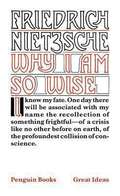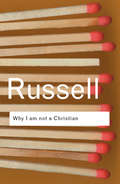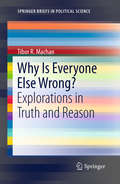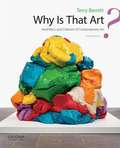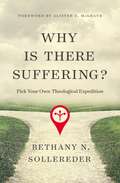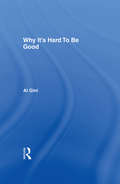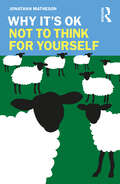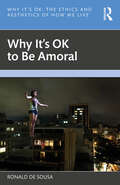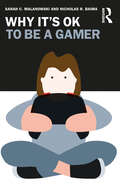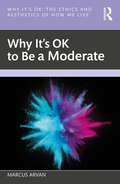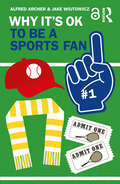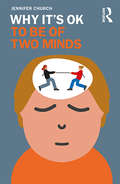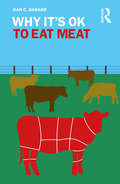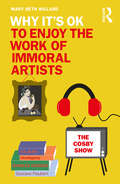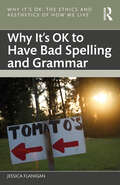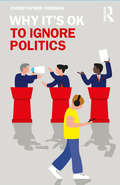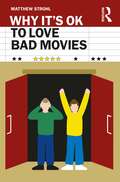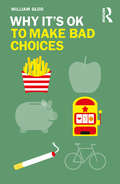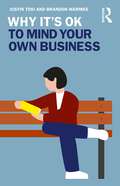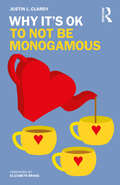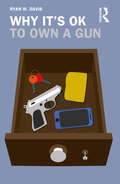- Table View
- List View
Why I am So Wise
by Friedrich NietzscheThroughout history, some books have changed the world. They have transformed the way we see ourselves—and each other. They have inspired debate, dissent, war and revolution. They have enlightened, outraged, provoked and comforted. They have enriched lives—and destroyed them. Now, Penguin brings you the works of the great thinkers, pioneers, radicals and visionaries whose ideas shook civilization, and helped make us who we are. Penguin's Great Ideas series features twelve groundbreaking works by some of history's most prodigious thinkers, and each volume is beautifully packaged with a unique type-drive design that highlights the bookmaker's art. Offering great literature in great packages at great prices, this series is ideal for those readers who want to explore and savor the Great Ideas that have shaped the world. One of the most iconoclastic thinkers of all time, Friedrich Nietzsche continues to challenge the boundaries of conventional religion and morality with his subversive theories of the 'superman', the individual will, the death of God and the triumph of an all-powerful human life force. .
Why I am not a Christian: and Other Essays on Religion and Related Subjects (Routledge Classics)
by Bertrand RussellWhile its tone is playful and frivolous, this book poses tough questions over the nature of religion and belief. Religion provides comfortable responses to the questions that have always beset humankind - why are we here, what is the point of being alive, how ought we to behave? Russell snatches that comfort away, leaving us instead with other, more troublesome alternatives: responsibility, autonomy, self-awareness. He tells us that the time to live is now, the place to live is here, and the way to be happy is to ensure others are happy.
Why Is Everyone Else Wrong?
by Tibor R. MachanEspecially when there is a lot of political rhetoric in the air, those of us with strong political convictions are inclined to reflect on just why we hold certain views even as others who are basically like us hold very different ones. Social scientists and other thinkers struggle to explain it, but the puzzle remains--in part because they, too, disagree so much with one another. Whether the arena is politics, religion, business, scientific research, or education, individuals who operate in the same environment and experience the same conditions may have radically different interpretations of the facts and diametrically opposed convictions about how to react to them. When faced with a fundamental disagreement, we ask ourselves: Why are these folks so wrong? And how can they be so convinced that we are wrong? In this provocative monograph, Tibor Machan explores the principles of truth, reason, and ideology, with particular respect to the profound political, economic, and social crises gripping the world today. In so doing, he not only sheds light on the nature of "truth" but also suggests a framework for embracing differences to come up with creative solutions.
Why Is That Art: Aesthetics and Criticism of Contemporary Art
by Terry BarrettIt introduces students to theories of art through the presentation of contemporary works that include abstract and representational painting, animated film, monumental sculpture,performance art, photographs, relational art, and video installations.
Why Is There Philosophy of Mathematics At All?
by Ian HackingThis truly philosophical book takes us back to fundamentals - the sheer experience of proof, and the enigmatic relation of mathematics to nature. It asks unexpected questions, such as 'what makes mathematics mathematics?', 'where did proof come from and how did it evolve?', and 'how did the distinction between pure and applied mathematics come into being?' In a wide-ranging discussion that is both immersed in the past and unusually attuned to the competing philosophical ideas of contemporary mathematicians, it shows that proof and other forms of mathematical exploration continue to be living, evolving practices - responsive to new technologies, yet embedded in permanent (and astonishing) facts about human beings. It distinguishes several distinct types of application of mathematics, and shows how each leads to a different philosophical conundrum. Here is a remarkable body of new philosophical thinking about proofs, applications, and other mathematical activities.
Why Is There Suffering?: Pick Your Own Theological Expedition
by Bethany N. SollerederYour journey begins. The road before you is smooth and straight. You walk for some time, recalling your experiences that call into question the deep realities of life. Up ahead, you can see the road branching in three directions. . .In Why Is There Suffering? you, reader, control the route you take through its "choose-your-own-path" chapters, asking questions and exploring different theological possibilities on the big topics of:God's existenceGod's natureThe nature of sufferingEvilPainFinal destiny Taking an intentionally light-hearted approach to a heavy topic this book presents an illustrative introduction to the problem of suffering and the most commonly offered responses to it. Along the road, you'll face multiple possibilities regarding suffering and its theological explanations, and you'll make choices about which one you find most plausible, skipping to that section of the book. Each decision you make leads to further complexities and new choices that reveal how theological beliefs lead to certain conclusions.This book does not offer final answers. Instead, it introduces the "theological" possibilities—both Christian and non-Christian—that you can explore and wrestle with to make informed decisions about your beliefs and clearly see the road you've taken to reach such beliefs.You are, of course, in control of the paths you take through these pages. You decide which explanations work. You can always go back and see what would change if you'd taken a different path. And, who knows. . .you may find that certain pathways resonate with your experiences in ways you didn't expect.
Why It's Hard To Be Good
by Al GiniIn a series of brief chapters, Al Gini lays out ideas for 'stepping out of the shadow of the self' - an argument for stopping thinking of yourself as the centre of the universe. It's hard to be good, he explains, until we realize that being good only has meaning in relation to other people. Ideas of justice, fairness, and ethical behavior are just that - abstract ideas - until they are put into action with regard to people outside ourselves.We may worry too much about good versus evil - big concepts that give us plenty of room to sit on the right side of the equation, he argues. Instead, we need to be thinking about how being good involves an active relationship toward others. Being good all by yourself may not be good enough. This warm and generous book is for anyone who wants to know how to use ethical thinking as way to live, work, and be with others.
Why It's OK Not to Think for Yourself (Why It's OK)
by Jonathan MathesonWe tend to applaud those who think for themselves: the ever-curious student, for example, or the grownup who does their own research. Even as we’re applauding, however, we ourselves often don’t think for ourselves. This book argues that’s completely OK. In fact, it’s often best just to take other folks’ word for it, allowing them to do the hard work of gathering and evaluating the relevant evidence. In making this argument, philosopher Jonathan Matheson shows how 'expert testimony' and 'the wisdom of crowds' are tested and provides convincing ideas that make it rational to believe something simply because other people believe it. Matheson then takes on philosophy’s best arguments against his thesis, including the idea that non-self-thinkers are free-riding on the work of others, Socrates’ claim that 'the unexamined life isn’t worth living,' and that outsourcing your intellectual labor makes you vulnerable to errors and manipulation. Matheson shows how these claims and others ultimately fail -- and that when it comes to thinking, we often need not be sheepish about being sheep. Key Features Discusses the idea of not thinking for yourself in the context of contemporary issues like climate change and vaccinations Engages in numerous contemporary debates in social epistemology Examines what can be valuable about thinking for yourself and argues that these are insufficient to require you to do so Outlines the key, practical takeaways from the argument in an epilogue
Why It's OK Not to Think for Yourself (Why It's OK)
by Jonathan MathesonWe tend to applaud those who think for themselves: the ever-curious student, for example, or the grownup who does their own research. Even as we’re applauding, however, we ourselves often don’t think for ourselves. This book argues that’s completely OK.In fact, it’s often best just to take other folks’ word for it, allowing them to do the hard work of gathering and evaluating the relevant evidence. In making this argument, philosopher Jonathan Matheson shows how 'expert testimony' and 'the wisdom of crowds' are tested and provides convincing ideas that make it rational to believe something simply because other people believe it. Matheson then takes on philosophy’s best arguments against his thesis, including the idea that non-self-thinkers are free-riding on the work of others, Socrates’ claim that 'the unexamined life isn’t worth living,' and that outsourcing your intellectual labor makes you vulnerable to errors and manipulation. Matheson shows how these claims and others ultimately fail -- and that when it comes to thinking, we often need not be sheepish about being sheep.Key Features Discusses the idea of not thinking for yourself in the context of contemporary issues like climate change and vaccinations Engages in numerous contemporary debates in social epistemology Examines what can be valuable about thinking for yourself and argues that these are insufficient to require you to do so Outlines the key, practical takeaways from the argument in an epilogue
Why It's OK to Be Amoral (Why It's OK)
by Ronald de SousaWhy It’s OK to Be Amoral argues that self-righteous moralism has replaced religion as a source of embattled and gratuitous certainties. High-minded moral convictions invoke the authority of sacred moral truths, but there are no such truths. In reality, moral passions are rooted in atavistic emotional dispositions and arbitrary social conventions.While public and private discourse is saturated with guilt, shame and righteous indignation, professional philosophers, under cover of clever argumentation, promote the utopian idea that all practical questions have uniquely right answers—providing that you adopt the right moral principles. But their justifications for those principles appeal to contested ‘foundations’, among which no rational adjudication is possible. Moreover, because there are two discrepant ways of understanding motivation, our access to agents’ true reasons is never sufficiently reliable to warrant moral praise or blame. Finally, every agent has a wide diversity of reasons for action, yet moralists claim that some reasons trump all others, because they are ‘moral’ reasons. Since these too must be grounded in facts, that amounts to double counting some reasons.Having exposed these aspects of the institution of morality, this book suggests that if we cannot abstain altogether from moralising, we can at least try to use it against itself.Key Features Describes and criticises seven approaches to the question, Why should I do or not do X? Develops an original objection to the idea of identifying a domain of moral reasons: namely, that it amounts to the unwarranted double counting of a subset of our reasons. Describes two ways of thinking about reasons and choices, and explains how the discrepancy between them makes it impossible to assess an agent’s motivation reliably enough to warrant moral praise or blame. Outlines the subtle changes in attitude involved in espousing amoralism, without giving up on rational choices and honest political commitments.
Why It's OK to Be a Gamer (Why It's OK)
by Nicholas R. Baima Sarah C. MalanowskiIf you enjoy video games as a pastime, you are certainly not alone—billions of people worldwide now play video games. However, you may still find yourself reluctant to tell others this fact about yourself. After all, we are routinely warned that video games have the potential to cause addiction and violence. And when we aren’t being warned of their outright harms, we are told we should be doing something better with our time, like going outside, socializing with others, or reading a book. Playing video games is thus often seen at best as a waste of time, and at worst a source of violent tragedy.Why It’s OK to Be a Gamer takes on the pervasive assumption that playing video games is a childish and time-wasting hobby, and a potentially addictive and dangerous one at that. It argues instead that there are many ways in which gaming can help us flourish, for example by: developing genuine friendships and other meaningful relationships with others, helping us cultivate a virtuous personal character, giving us a unique aesthetic experience, providing us with psychological benefits, and just plain helping us relax and enjoy ourselves. Video games are not just for those with no life; on the contrary, they can help contribute to a rich and meaningful life.Key Features Introduces the philosophy of video games in a humorous and lively way with lots of engaging examples Defends gaming through a virtue theoretic approach Discusses contemporary psychology and neuroscience literature on gaming Includes discussion of gamers, video games, and common experiences of gaming
Why It's OK to Be a Moderate (Why It's OK)
by Marcus ArvanConservatives and progressives rarely agree on much—but one thing many agree upon is that it’s not OK to be a moderate. This book shows they are wrong.In Why It’s OK to be a Moderate, Marcus Arvan shows how many of history’s worst evils have resulted from far-right and far-left radicalism, how escalating conflicts between conservatives and progressives are undermining democracy, and how many widely hailed social and political achievements have been achieved by moderates and radicals working in constructive tension with each other.Using philosophy, science, and historical analysis, Arvan shows that critics of moderates tend to equate them with spineless centrists, but that most moderates aren’t centrists, falling into diverse categories across the political spectrum. Arvan then shows that although radicals tend to be popular in their era, many of them have gone down in infamy, while many moderates, like Abraham Lincoln or Clement Attlee, have endured short-term unpopularity to “make history.”Arvan shows that it’s OK to be a moderate precisely because not everyone should be one. He makes this case to you, showing that whatever your reasonable political ideology may be, things tend to go best politically when radicals and moderates effectively complement each other’s virtues while counterbalancing the other’s vices.Key Features Uses science and historical analysis to show that while liberals and conservatives may have some political virtues, radicals on both sides of the political spectrum tend to display twelve political vices that undermine democracy Explores how Aristotle’s idea of the “Golden Mean” and Buddhism’s “Middle Way” might be used to better understand far-left and far-right mistakes in the UK, US, Continental Europe, and India Shows how moderates are a leading political demographic, existing in greater numbers than liberals or conservatives while falling into diverse categories across the political spectrum Documents how radicalism has underwritten many of history’s worst political events, along with many of the most widely acknowledged political problems of the 20th and 21st centuries Demonstrates to the reader that things tend to go best politically when radicals and moderates work in constructive tension with each other, and worst when there aren’t enough moderates
Why It's OK to Be a Sports Fan (Why It's OK)
by Alfred Archer Jake WojtowiczThis book offers readers a pitch-side view of the ethics of fandom. Its accessible six chapters are aimed both at true sports fans whose conscience may be occasionally piqued by their pastime, and at those who are more certain of the moral hazards involved in following a team or sport. Why It’s OK to Be a Sports Fan wrestles with a range of arguments against fandom and counters with its own arguments on why being a fan is very often a good thing. It looks at the ethical issues fans face, from the violent or racist behavior of those in the stands, to players’ infamous misdeeds, to owners debasing their own clubs. In response to these moral risks, the book argues that by being critical fans, followers of a team or individual can reap the benefits of fandom while avoiding many of the ethical pitfalls. The authors show the value in deeply loving a team but also how a condition of this value is recognizing that the love of a fan comes with real limits and responsibilities. Key Features Provides an accessible introduction to a key area of the philosophy of sport Closely looks at some of the salient ethical concerns around sports fandom Proposes that the value of community in partisan fandom should not be underestimated as a key feature of the good life Examines how the same emotions and environments that can lead to violence are identical to those that lead to virtuous loyalty Argues for a fan’s responsibility in calling out violence or racist behavior from their fellow fans
Why It's OK to Be a Sports Fan (Why It's OK)
by Alfred Archer Jake WojtowiczThis book offers readers a pitch-side view of the ethics of fandom. Its accessible six chapters are aimed both at true sports fans whose conscience may be occasionally piqued by their pastime, and at those who are more certain of the moral hazards involved in following a team or sport.Why It’s OK to Be a Sports Fanwrestles with a range of arguments against fandom and counters with its own arguments on why being a fan is very often a good thing. It looks at the ethical issues fans face, from the violent or racist behavior of those in the stands, to players’ infamous misdeeds, to owners debasing their own clubs. In response to these moral risks, the book argues that by being critical fans, followers of a team or individual can reap the benefits of fandom while avoiding many of the ethical pitfalls. The authors show the value in deeply loving a team but also how a condition of this value is recognizing that the love of a fan comes with real limits and responsibilities.Key Features Provides an accessible introduction to a key area of the philosophy of sport Closely looks at some of the salient ethical concerns around sports fandom Proposes that the value of community in partisan fandom should not be underestimated as a key feature of the good life Examines how the same emotions and environments that can lead to violence are identical to those that lead to virtuous loyalty Argues for a fan’s responsibility in calling out violence or racist behavior from their fellow fans The Open Access version of this book, available at http://www.taylorfrancis.com, has been made available under a Creative Commons [Creative Commons Attribution (CC-BY)] 4.0 license.
Why It's OK to Be of Two Minds (Why It's OK)
by Jennifer ChurchMost of us experience the world through competing perspectives. A job or a religion seems important and fulfilling when looked at in one way, but from a different angle they seem tedious or ridiculous. A friend is obtuse from one point of view, wise from another. Continuing to hold both views at once can be unsettling, highlighting conflicts between our own judgments and values and undermining our ability to live purposefully and effectively. Yet, as Jennifer Church argues in this book, inner conflict can be a good thing, and not just as a temporary road bump on the road to resolution. This book describes several desirable types of “double consciousness” – or being of two minds – and explains why and how they should be maintained. Church looks critically at some common ideas about identity, including a popular belief about narratives that suggests our lives should “make sense” as a story. She also examines how empathy can helpfully cause us to be of two minds, and how various forms of irony and laughter enable us to benefit from holding onto opposing views. Finally, Church shows the merit of acknowledging reality while sometimes being guided by fantasy. Why It’s OK to Be of Two Minds is for anyone who’s held two opposing views simultaneously, which is to say it’s for everyone. Key Features • Argues against a long-standing philosophical idea: that it is important to resolve inner conflicts that result from competing systems of beliefs. • Examines the role of empathy and friendship in maintaining a valuable form of double consciousness. • Considers how irony and laughter allow us to dedicate ourselves to our particular projects while acknowledging their ultimate insignificance. • Shows how fantasies that conflict with our beliefs can make a positive contribution to the way we live our lives.
Why It's OK to Eat Meat (Why It's OK)
by Dan C. ShaharVegetarians have argued at great length that meat-eating is wrong. Even so, the vast majority of people continue to eat meat, and even most vegetarians eventually give up on their diets. Does this prove these people must be morally corrupt? In Why It’s OK to Eat Meat, Dan C. Shahar argues the answer is no: it’s entirely possible to be an ethical person while continuing to eat meat—and not just the "fancy" offerings from the farmers' market but also the regular meat we find at most supermarkets and restaurants. Shahar’s examination forcefully echoes vegetarians’ concerns about the meat industry’s impacts on animals, workers, the environment, and public health. However, he shows that the most influential ethical arguments for avoiding meat on the basis of these considerations are ultimately unpersuasive. Instead of insisting we all become vegetarians, Shahar argues each of us has broad latitude to choose which of the world’s problems to tackle, in what ways, and to what extents, and hence people can decline to take up this particular form of activism without doing anything wrong. Key Features First book-length defense of meat-eating written for a popular audience Punchy, accessible introduction to the multifaceted debate over the ethics of eating meat Includes pioneering new examinations of humane labeling practices Shows why appeals to universalized patterns of behavior can’t vindicate vegetarians’ claims that there’s a duty to avoid meat Develops a novel theory of ethical activism with potential applications to a wide range of other issues
Why It's OK to Eat Meat (Why It's OK)
by Dan C. ShaharVegetarians have argued at great length that meat-eating is wrong. Even so, the vast majority of people continue to eat meat, and even most vegetarians eventually give up on their diets. Does this prove these people must be morally corrupt? In Why It’s OK to Eat Meat, Dan C. Shahar argues the answer is no: it’s entirely possible to be an ethical person while continuing to eat meat—and not just the "fancy" offerings from the farmers' market but also the regular meat we find at most supermarkets and restaurants. Shahar’s examination forcefully echoes vegetarians’ concerns about the meat industry’s impacts on animals, workers, the environment, and public health. However, he shows that the most influential ethical arguments for avoiding meat on the basis of these considerations are ultimately unpersuasive. Instead of insisting we all become vegetarians, Shahar argues each of us has broad latitude to choose which of the world’s problems to tackle, in what ways, and to what extents, and hence people can decline to take up this particular form of activism without doing anything wrong.Key Features First book-length defense of meat-eating written for a popular audience Punchy, accessible introduction to the multifaceted debate over the ethics of eating meat Includes pioneering new examinations of humane labeling practices Shows why appeals to universalized patterns of behavior can’t vindicate vegetarians’ claims that there’s a duty to avoid meat Develops a novel theory of ethical activism with potential applications to a wide range of other issues
Why It's OK to Enjoy the Work of Immoral Artists (Why It's OK)
by Mary Beth WillardThe #metoo movement has forced many fans to consider what they should do when they learn that a beloved artist has acted immorally. One natural thought is that fans ought to give up the artworks of immoral artists. In Why It’s OK to Enjoy the Work of Immoral Artists, Mary Beth Willard argues for a more nuanced view. Enjoying art is part of a well-lived life, so we need good reasons to give it up. And it turns out good reasons are hard to find. Willard shows that it’s reasonable to believe that most boycotts of artists won’t succeed, so most of the time there’s no ethical reason to join in. Someone who manages to separate the art from the artist isn’t making an ethical mistake by buying and enjoying their art. She then considers the ethical dimensions of canceling artists and the so-called "cancel culture," arguing that canceling is ethically risky because it encourages moral grandstanding. Willard concludes by arguing that the popular debate has overlooked the power of art to change our lives for the good. It’s of course OK to decide to give up the artwork of immoral artists, but – as Willard shows in this provocative little volume – it’s OK to continue to enjoy their art as well. Key Features Offers accessible discussions of complicated philosophical topics like aesthetic value, collective action problems, and epistemic justice Provides a unique perspective and underexplored argument on the popular issue of cancellation Explores the role of aesthetic value in our lives, including its relation to our ethical decisions and our well being
Why It's OK to Have Bad Spelling and Grammar (Why It's OK)
by Jessica FlaniganGrammatical errors and orthographic mishaps are often played for laughs, but this subtle sanctioning by the sticklerocracy can have real social consequences too. Attention to prescriptive spelling and grammar rules is insidious and harmful.As Jessica Flanigan argues in Why It’s OK to Have Bad Spelling and Grammar, grammarianism often maintains hierarchies, entrenches the advantages of privileged groups, and imposes arbitrary barriers to knowledge production and innovation. For example, the stigmatization of bad spelling and grammar disadvantages linguistic minorities, non-native speakers, and people with disabilities. Spelling and grammar norms are also frequently arbitrary and unnecessary. The petty grammandos among us, who cling to pedantic linguistic conventions, are standing in the way of innovative forms of communication and efficient speech, such as the emoji ☺. For these reasons, Flanigan argues that bad spelling and grammar are OK. It’s time to break free from the tyranny of the grammilitia in the name of comprehension and creativity. As long as speakers and writers can effectively communicate to charitable listeners and readers, people shouldn’t care about bad spelling and grammar.Key Features Explains why spelling tests and spelling bees are counterproductive in achieving literacy and better communication Engages with the history of language policing and the brave anti-grammarian resistance Describes some of the key benefits of linguistic liberalism Proposes a political agenda to resist the sticklerocracy and overthrow a world of word nerds
Why It's OK to Ignore Politics (Why It's OK)
by Christopher FreimanDo you feel like you’re the only person at your office without an "I Voted!" sticker on Election Day? It turns out that you're far from alone – 100 million eligible U.S. voters never went to the polls in 2016. That’s about 35 million more than voted for the winning presidential candidate. In this book, Christopher Freiman explains why these 100 million need not feel guilty. Why It’s OK to Ignore Politics argues that you’re under no obligation to be politically active. Freiman addresses new objections to political abstention as well as some old chestnuts ("But what if everyone stopped voting?"). He also synthesizes recent empirical work showing how our political motivations distort our choices and reasoning. Because participating in politics is not an effective way to do good, Freiman argues that we actually have a moral duty to disengage from politics and instead take direct action to make the world a better place. Key Features: Makes the case against a duty of political participation for a non-expert audience Presupposes no knowledge of philosophy or political science and is written in a style free of technical jargon Addresses the standard, much-repeated arguments for why one should vote (e.g., one shouldn’t free ride on the efforts of others) Presents the growing literature on politically motivated reasoning in an accessible and entertaining way Covers a significant amount of new ground in the debate over a duty of political participation (e.g., whether participating absolves us of our complicity in state injustice) Challenges the increasingly popular argument from philosophers and economists that swing state voting is effective altruism Discusses the therapeutic benefits of ignoring politics—it’s good for you, your relationships, and society as a whole.
Why It's OK to Love Bad Movies (Why It's OK)
by Matthew StrohlMost people are too busy to keep up with all the good movies they’d like to see, so why should anyone spend their precious time watching the bad ones? In Why It’s OK to Love Bad Movies, philosopher and cinematic bottom feeder Matthew Strohl enthusiastically defends a fondness for disreputable films. Combining philosophy of art with film criticism, Strohl flips conventional notions of "good" and "bad" on their heads and makes the case that the ultimate value of a work of art lies in what it can add to our lives. By this measure, some of the worst movies ever made are also among the best. Through detailed discussions of films such as Troll 2, The Room, Batman & Robin, Twilight, Ninja III: The Domination, and a significant portion of Nicolas Cage’s filmography, Strohl argues that so-called "bad movies" are the ones that break the rules of the art form without the aura of artistic seriousness that surrounds the avant-garde. These movies may not win any awards, but they offer rich opportunities for creative engagement and enable the formation of lively fan communities, and they can be a key ingredient in a fulfilling aesthetic life. Key Features: Written in a humorous, approachable style, appealing to readers with no background in philosophy. Elaborates the rewards of loving bad movies, such as forming unlikely social bonds and developing refinement without narrowness. Discusses a wide range of beloved bad movies, including Plan 9 from Outer Space, The Core, Battlefield Earth, and Freddy Got Fingered. Contains the most extensive discussion of Nicolas Cage ever included in a philosophy book.
Why It's OK to Make Bad Choices (Why It's OK)
by William GlodIf we are kind people, we care about others, including others who tend to hurt themselves. We all have friends or family members who have potential but squander or even ruin their lives from things like drug abuse, unwise spending decisions, or poor dietary habits. Concern for others often motivates us to endorse laws or private interventions meant to keep people from harming themselves even if that’s what they want to do in the moment. However, it is far from clear that such paternalistic measures are, on net, benign, and they tend to violate an understanding that we should let adults make their own decisions. In this little book, William Glod argues that it’s OK to allow people to make bad choices. It’s OK even if those choices risk causing a lot of harm. Most defenders of paternalism agree that some bad choices are not harmful enough to require laws to stop them. However, Glod goes further. He argues that some people might want – and deserve – the freedom to make truly bad choices because such freedom is the only way they can act responsibly. He also argues that some "bad" choices may not even be bad, even if we can't know with confidence a person's true desires. In addition, the book explores choices that are bad because they might impose high monetary costs on others, arguing that mandatory insurance may be a better solution than eliminating the choice. Finally, it explores the potential pitfalls of paternalistic laws and policies – and how unintended, costly consequences can sabotage the most well-intended plans. Key Features Introduces key concepts for understanding paternalism and freedom of choice for undergraduates and general readers Discusses how many of our preferences are not easily understood by others, and shows how assumptions of what our true preferences can often backfire Explores ways in which people may want the freedom to make mistakes Examines the unintended consequences and associated problems of many paternalistic laws and regulations
Why It's OK to Mind Your Own Business (Why It's OK)
by Justin Tosi Brandon WarmkeEvery year, millions of students in the United States and around the world graduate from high school and college. Commencement speakers—often distilling the hopes of parents and four years of messaging from educators—tell graduates that they must do something grand, ambitious, or far-reaching. Change the world. Disrupt the status quo. Every problem in the world is your problem, awaiting your solutions. This book is an antidote to that advice. It provides a clear-eyed assessment of three types of people who tend to believe and promote a commencement speaker’s view of the world: the moralizer, who imposes unnecessary social costs by inappropriately enforcing morality; the busybody, who thinks the stranger and close friend merit equal shares of our benevolent attention; and the pure hearted, who equates acting with good intentions with just outcomes. The book also provides a bold defense of living an ordinary life by putting down roots, creating a good home, and living in solitude. A quiet, peaceful life can be generous and noble. It’s OK to mind your own business.
Why It's OK to Not Be Monogamous (Why It's OK)
by Justin L. ClardyThe downsides of monogamy are felt by most people engaged in long-term relationships, including restrictions on self-discovery, limits on friendship, sexual boredom, and a circumscribed understanding of intimacy. Yet, a "happily ever after" monogamy is assumed to be the ideal form of romantic love in many modern societies: a relationship that is morally ideal and will bring the most happiness to its two partners. In Why It’s OK to Not Be Monogamous, Justin L. Clardy deeply questions these assumptions. He rejects the claim that non-monogamy among honest, informed and consenting adults is morally impermissible. He shows instead how polyamorous relationships can actually be exemplars of moral virtue. The book discusses how social and political forces sustain and reward monogamous relationships. The book defines non-monogamy as a privative concept; a negation of monogamy. Looking at its prevalence in the United States, the book explains how common criticisms of non-monogamy come up short. Clardy argues, as some researchers have recently shown—monogamy relies on continually demonizing non-monogamy to sustain its moral status. Finally, the book concludes with a focus on equality, asking what justice for polyamorous individuals might look like.
Why It's OK to Own a Gun (Why It's OK)
by Ryan W. DavisWhy It’s OK to Own a Gun explores the right to self-defense, but also looks beyond it to what gun ownership fundamentally means in American life. Guns can provide a source of meaning that doesn’t depend on how much money you have or how important your job is. Guns can offer a sense of shared identity that’s not hung up on intellectual credentials or ideological orthodoxy. For many responsible gun owners, owning a gun is a way of positively reclaiming one’s own agency in the world. It’s true that guns matter to only a minority of Americans, but the same could be said for many important political liberties. Like freedom of religion and freedom of expression, guns should be on the list of basic rights. In fact, they are: as some in America’s founding generation anticipated, gun rights have offered a bulwark for republican freedom. Because there is nothing morally wrong with any of these values, owning a gun is OK. Key Features: Discusses the grounds of the political rights of gun ownership Connects the debate over guns with the sociology of gun ownership Describes genuinely worthwhile features of a way of life that’s unfamiliar to many readers Considers empirical and normative aspects of the gun debate Thinks about individual rights in the context of state power
